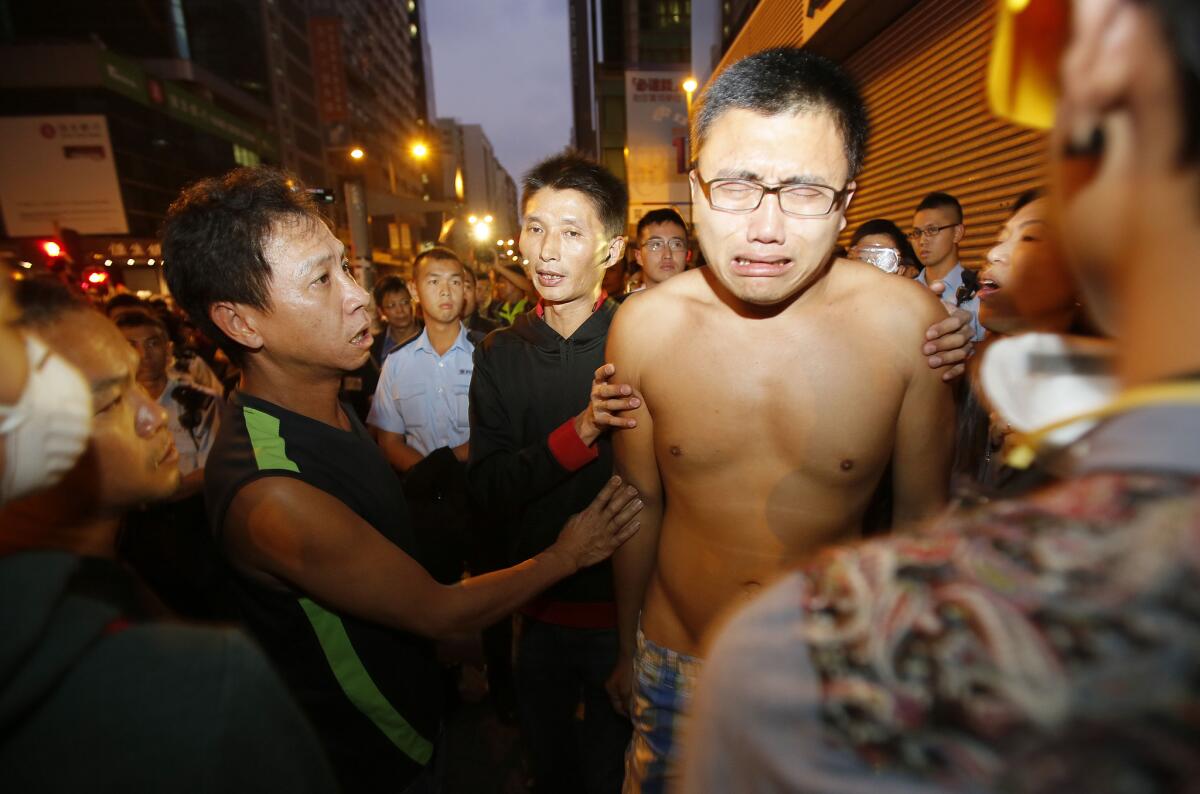Hong Kong police clear protesters’ barricades, face little resistance

- Share via
Reporting from Hong Kong — Hong Kong police cleared barricades erected by democracy demonstrators in the Mong Kok neighborhood early Friday, encountering little resistance from the dwindling number of protesters camped out there.
Hundreds of officers arrived on the scene starting about 5 a.m., removing barricades, tents, signs, a small shrine and personal items. Police equipped with shields then packed streets in the area, perhaps to prevent a re-occupation. Traffic was flowing in the area by 7 a.m., local media reported.
The operation came a day after Hong Kong’s chief executive offered to hold a dialogue with one of the key student groups leading democracy protests, The proposal failed, however, to rouse much enthusiasm among demonstrators as he rejected one of their key demands: open nominations for the city’s 2017 election.
Holding his first news conference since the demonstrations began in late September, Leung Chun-ying said Thursday that his administration was willing to talk with the Hong Kong Federation of Students as soon as next week. Several middlemen, he said, have been dispatched to begin a dialogue.
An agreement to hold talks the first week of October collapsed almost immediately amid a failure to agree on ground rules and other issues. Addressing demonstrators Thursday night, Federation of Students leader Alex Chow expressed an openness to meeting with the government, saying discussions would “show their true colors.”
“Soon after the dialogue, we will know whether this government is still accountable to its people; we will know whether the government still fights for its people, and whether it still has the right to be our government.”
Meanwhile, Chow said, there will be continued civil disobedience to express displeasure with the government.
Protesters on the streets, however, appeared unmoved by Leung’s offer.
“I don’t think the government is sincere about talking to us,” said Christopher Wan, a 19-year-old student. “They have not even satisfied any one of our demands, not even apologized for the police’s poor behavior, not to mention the public nomination of chief executive.
“Based on what they did before, I can’t help thinking the only reason they want to restart talks is just to disperse us as soon as possible.”
At his news conference, Leung said the Hong Kong government was eager to restore the flow of traffic; key roads around government headquarters have been occupied now for 19 days.
As protester numbers decreased this week, police moved in to remove some barricades in the Central and Causeway Bay areas. But thoroughfares in the Admiralty district remained impassable.
Demonstrators in Hong Kong, a former British colony that returned to Chinese rule in 1997 under a framework known as “one country, two systems,” have taken to the streets to demand open nominations of candidates for the chief executive election in 2017. But the central government in Beijing has rejected such a framework, insisting that all candidates must be approved by a special committee.
Leung on Thursday reiterated his position that the election guidelines issued by the standing committee of China’s National People’s Congress, the country’s rubber-stamp parliament, cannot be revised and that all negotiations should be based on the Basic Law, the document laying out the 1997 transfer that was supposed to guarantee Hong Kong a high degree of autonomy for 50 years.
“It is not a matter of whether the government is willing to step back,” Leung said. “There is room for conversation, but demands for a revision of the NPC’s decision or the Basic Law are just unrealistic. The central government has said clearly that they won’t retract.”
Protesters say the Basic Law calls for Hong Kong to adopt a system of universal suffrage for electing the chief executive and that the restrictions mandated by Beijing contravene the letter and spirit of the law.
Leung said he was willing to talk with protesters about what can be done within the framework set by Beijing. “Politics is the art of the possible,” Leung said.
He said that he expected several rounds of talks rather than a one-off negotiation and that he would welcome someone such as a local university vice chancellor to chair the dialogue.
Leung’s comments came a day after police and demonstrators clashed following protesters’ efforts to blockade a key east-west road near Leung’s office early Wednesday. Police arrested 45 people, including Civic Party activist Ken Tsang.
On Wednesday, local broadcaster TVB aired a video apparently showing Tsang being beaten by police officers. Seven officers were suspended Thursday amid an investigation of the situation.
Leung defended the police’s performance, saying that the police had shown “maximum tolerance.”
Tsang returned to the streets Thursday night and called on citizens to not turn against the entire police force.
“Those who beat me were the bad police, but not all of the police are bad people,” Tsang said. “Don’t hate the police because of my suffering. We have never and will never use violence against violence.”
Occupy Central with Love and Peace, one of the main protest groups, issued a statement Thursday expressing outrage over the incident and acknowledging “increasing tension between demonstrators and frontline police officers.”
“Although [Occupy Central] finds the abuse of power by individual police officers to be hateful, we urge every occupier not to forget our original intention, that is to fight for a democratic political system with love and peace,” the statement said.
“Our target should be the dictator who ignores public opinion. We should not misfire and give the government an excuse for repression.”
Special correspondent Hui reported from Hong Kong and Times staff writer Makinen from Beijing.
Twitter: @JulieMakLAT
More to Read
Sign up for Essential California
The most important California stories and recommendations in your inbox every morning.
You may occasionally receive promotional content from the Los Angeles Times.














